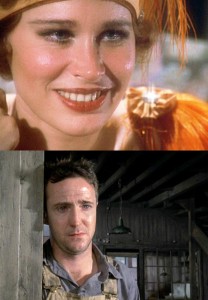The idea of Marxism is represented by the relationship between Myrtle Wilson and her husband, George. Myrtle explains their marriage at the small party in New York: “‘I married him because I thought he was a gentleman,’ she said finally. ‘I thought he knew something about breeding, but he wasn’t fit to lick my shoe'” (pg. 35) and later claiming that George “borrowed somebody’s best suit to get married in, and never even told [her] about it.” (pg. 35) Even though Myrtle lives with a poor uneducated man in the Valley of Ashes, she is of a much higher social class than her husband – or at least acts as though she is. However, regardless of actual wealth and status, it is one’s actions that identify a person with a certain class.
When George and Myrtle are first introduced in Chapter 2, the words used to describe each of them are very different. George is described as a “blond, spiritless man, anæmic, and faintly handsome.” (pg. 25) The diction used in this description as well as in later passages relating to George gives off an air of monotony, making George appear to the reader as a very boring person. In contrast, the language used when Myrtle is first introduced is far more lively and interesting: “She was in the middle thirties, and faintly stout, but she carried her surplus flesh sensuously as some women can. Her face, above a spotted dress of dark blue crêpe-de-chine, contained no facet of gleam or beauty, but there was an immediately perceptible vitality about her as if the nerves of her body were continually smouldering.” (pg. 25) Although George is said to be handsome and Myrtle to have no facet of beauty in her face, Myrtle is a far more desirable and exciting character because of the degree to which society inherently values the upper class. Myrtle’s allure in contrast to George’s plainness is also shown through pathetic fallacy when “a white ashen dust veiled [George’s] suit and his pale hair as it veiled everything in the vicinity – except his wife.” (pg. 26) This imagery passage makes Myrtle seem to glow and stand out even in the dreariest setting.
In Marxist theory, a class struggle is described: the constant battle between the upper class and the lower class. Myrtle, the bourgeoise, treats George, the proletariat, with no utterance of respect and acts as though she is more important and more valuable than he. At one point, she “[walks] through her husband as if he were a ghost” (pg. 25) and orders him “without turning around” (pg. 26) to fetch chairs for their guests, which he dutifully obeys. Much later in the novel, George is described as “his wife’s man and not his own” (pg. 137), a description that is very apt for George Wilson. Myrtle’s clear control over her husband is representative of the conflict between social classes upon which the principles of Marxism are based.
The Wilsons as they appeared in the 1974 film adaptation. Note the fact that while Myrtle is not very attractive and George is quite handsome, from these pictures alone, Myrtle is already perceived as the more enthralling character.
